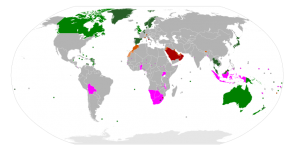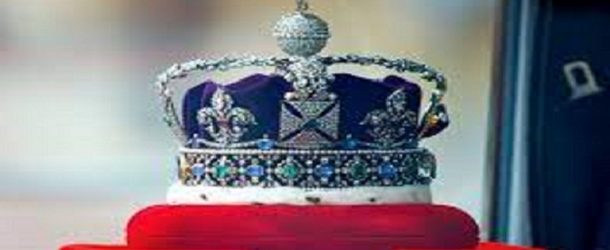It is a fact that the popular trend in global politics for the last two centuries has been essentially based on the concepts of republic and democracy. However, it does not mean that monarchies perished and lost their legitimacy completely. In fact, there are still many monarchies in the world with different shapes and forms. In this short piece, I am going to look at the situation of different monarchies in the world and I will try to categorize them in terms of their political regime. But in order to do that, I will begin by defining monarchy and how monarchical regimes are legitimized in politics.
Monarchy, according to Britannica is a “political system based upon the undivided sovereignty or rule of a single person”.[1] Merriam-Webster Dictionary on the other hand defines monarchy with three different meanings as follows: 1. “undivided rule or absolute sovereignty by a single person”, 2. “a nation or state having a monarchical government”, and 3. “a government having a hereditary chief of state with life tenure and powers varying from nominal to absolute”.[2] So, both definitions -as well as others- focus on the sovereignty and rule of a single person as a common characteristic of monarchies. However, looking at the modern practice of monarchies in the world, one can claim that the correct explanation is closer to the third definition made by Merriam-Webster Dictionary as “a government having a hereditary chief of state with life tenure and powers varying from nominal to absolute” since there are different monarchies changing from tolitarianism to democracy. Moreover, monarchies all protect their hereditary notion, and the succession takes place while the ruler is passed away – often the eldest child becoming the new monarch. Throughout the history, monarchs carried various titles such as Emperor, Empress, King, Queen, Raja, Khan, Tsar, Sultan, Shah, or Pharaoh.
The legitimization of monarchies is often made by theocratic arguments. In that sense, Hegelian definition of the state as “God’s march on earth” seems very relevant here as monarchies are almost all time legitimized as godlike or divine structures. Monarchy represents a fundamental challenge to the notion of republic as the sovereignty belongs to a ruler chosen and supported by God. In republican concept however, the sovereignty is accepted to belong to the people although republican regimes can also become quite antidemocratic.

Monarchies in the world[3]
As of 2022, there are 43 monarchies left in the world. There are 13 monarchies in Asia, 12 in Europe, 9 in the Americas, 6 in Oceania, and 3 in Africa. In that sense, monarchies still exist in all continents (with a little exception of South America). Monarchies in Asia are Bahrain, Bhutan, Brunei, Cambodia, Japan, Jordan, Kuwait, Malaysia, Oman, Qatar, Saudi Arabia, Thailand, and the United Arab Emirates (UAE). Monarchies in Europe are Andorra, Belgium, Denmark, Liechtenstein, Luxembourg, Monaco, Netherlands, Norway, Spain, Sweden, the United Kingdom, and the Vatican (Holy See). Monarchies in the Americas are Antigua and Barbuda, Bahamas, Belize, Canada, Grenada, Jamaica, Saint Kitts and Nevis, Saint Lucia, and Saint Vincent and the Grenadines. Monarchies in Oceania are Australia, New Zealand, Papua New Guinea, Solomon Islands, Tonga, and Tuvalu. Monarchies in Africa are Eswatini, Lesotho, and Morocco.
If we make a categorization of these monarchies in terms of their regimes; we can talk about (1) absolute monarchies where the ruler still has full sovereignty, (2) constitutional monarchies in which rulers’ powers are limited by a parliament and a constitution, and (3) symbolic monarchies where rulers only have certain ceremonial duties and very limited powers. In that sense, absolute monarchies still represent a major challenge to the theory of democracy whereas symbolic monarchies are already democratic states. Constitutional monarchies on the other hand are mixed regimes situated between these two categories. In absolute monarchies, the ruler is autocrat with absolute power over the state and government. Saudi Arabia and other Gulf states are typical examples of absolute monarchies where the head of state wields unlimited power for an unlimited amount of time. Jordan for instance is a typical constitutional democracy still having some problems related to democratization. Symbolic monarchies on the contrary are full democracies with little problems of democracy and human rights. The United Kingdom and other European monarchies can be listed in this category due to their sophisticated understanding of democracy and human rights.
So, finally, can we claim that there is no place anymore for monarchies in the world? I would respond simply “no” due to several reasons. First of all, as in the case of British and European monarchies, monarchies can continue to exist by providing a smooth transition into democratic regimes in time. It is a fact that democracy is more important in our age than a republican system. In that sense, monarchies do not pose an existential threat to democracy as the evidence (the UK example etc.) suggests. Secondly, in the case of Asian and African countries, monarchies still seem relevant and better functioning than their alternatives. Especially in the Muslim geography, monarchies have considerable legitimacy and support among the people. Unfortunately, there are very few successful examples of democratic regime in the Islamic world. In that sense, in the Middle East, republican systems also (Baathist regimes, military rule or theocratic republicanism as in the case of Iran etc.) tend to be antidemocratic. Thus, monarchies can survive even in the 21st century with all their extratemporal characteristics.
Assoc. Prof. Ozan ÖRMECİ
[1] Britannica, “monarchy”, Date of Accession: 09.01.2023 from https://www.britannica.com/topic/monarchy.
[2] Merriam-Webster Dictionary, “monarchy”, Date of Accession: 09.01.2023 from https://www.merriam-webster.com/dictionary/monarchy.
[3] Wikipedia, “List of current monarchies”, Date of Accession: 09.01.2023 from https://en.wikipedia.org/wiki/List_of_current_monarchies.

























































